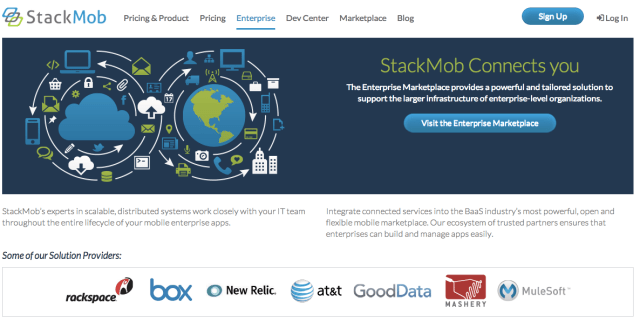Mobile backend-as-a-service (MBaaS) platform StackMob is expanding upon its earlier launch of a marketplace for third-party services, with the debut of a marketplace targeted toward enterprise customers. Through a series of partnerships, the marketplace allows StackMob to promote its integrations with other software and platforms-as-a-service companies, API infrastructure providers and more, initially including services from AT&T, Alfresco, Box, Braintree, GoodData, Mashery, Mulesoft, New Relic and Rackspace.
The move signals StackMob’s goal of attracting more enterprise customers to its platform. That’s a customer base that CEO Ty Amell describes as “small” today. Currently, there are around 15 to 20 enterprise companies working with StackMob on apps, ranging from those in the proof-of-concept phase to those which are in active development. StackMob is under NDA with these enterprise customers, so Amell can’t provide names, but says all apps are what you could characterize as “mission-critical.”
“It’s not these one-off marketing apps; it’s not a game for an enterprise company,” he explains. “That’s a really interesting shift, because it shows that the enterprise is really starting to trust StackMob in this space,” he adds. “Until now, if you looked at most of the other MBaaS providers, you might see some enterprise, but it’s usually through an agency, and it’s usually not mission-critical.”
Servicing the enterprise has always been on StackMob’s long-term roadmap, but in the near-term, the company was hearing the same questions from the enterprise over and over, Amell tells us. For example, “how do I securely connect you to my legacy system?” “How do I get this third-party API integrated?” “How do I control when it’s internal data versus external data?” “How do I do payment processing?” etc. The idea was to centralize all the things that StackMob can do for the enterprise under one umbrella.
While the previously launched and developer-focused StackMob Marketplace offers clickable modules for adding services from partners like Apsalar, Kontrol.io, Crittercism, PubNub, SendGrid, Urban Airship, UserVoice and others, the Enterprise Marketplace is different, as it’s not about one-click integrations. If anything, it’s more about advertising StackMob’s enterprise capabilities and partnerships than it is about providing sign-up flows and deals.
Amell also notes, though, that the cost to enterprise customers is cheaper than if they went out to the various services individually. Still, the only “action” that’s possible in the marketplace today is the ability to fill out a form requesting that someone from StackMob call back. It’s very lead gen.
The push into the enterprise is important, because in this over-saturated market of MBaaS companies, there will end up only being a few survivors, as the herd is thinned. Smaller players will likely bite the dust over the next year or two.
Unlike StackMob’s competitor Y Combinator-backed Parse, Amell declined to share hard metrics illustrating StackMob’s traction. Instead he simply says, “we have revenue; we’ll have to raise another round.” He says the round would be needed to grow the sales team and expand faster. “The dirty secret with backends-as-a-service is that it takes a lot of time and money, especially when you’re talking about enterprise. It takes a lot of time to become profitable,” he says. “We’re on a nice path there, but we’re not revenue-positive.”
Amell also refers to StackMob as a founding company in this space, which is true – as a three-year old company, it was among the first. And he touts that StackMob is ahead in some areas. “Every time we do something, the others follow suit,” Amell claims. He even specifically calls out Parse’s third-party integrations (called “cloud modules”), saying that at Parse, they don’t provision the accounts for users and they don’t do all the things that make it a marketplace versus the StackMob Marketplace (though not necessarily this Enterprise version, it seems). Plus, he adds that StackMob has been doing custom code “forever,” as opposed to Parse’s more recent support.
Yet, as everyone knows, “first” doesn’t always translate to last man standing. And Parse and StackMob have been fighting for developer mind share. In October, Parse had 40,000 developers and just about the same number of apps. Today it has 60,000 apps and around the same number of developers. StackMob in November had 15,000 developers and 40,000 apps, and those are still roughly the same. All that being said, both companies are operating freemium services, so at the end of the day, it comes down not to raw numbers, but who’s paying and how much. And these are figures that neither disclose.

